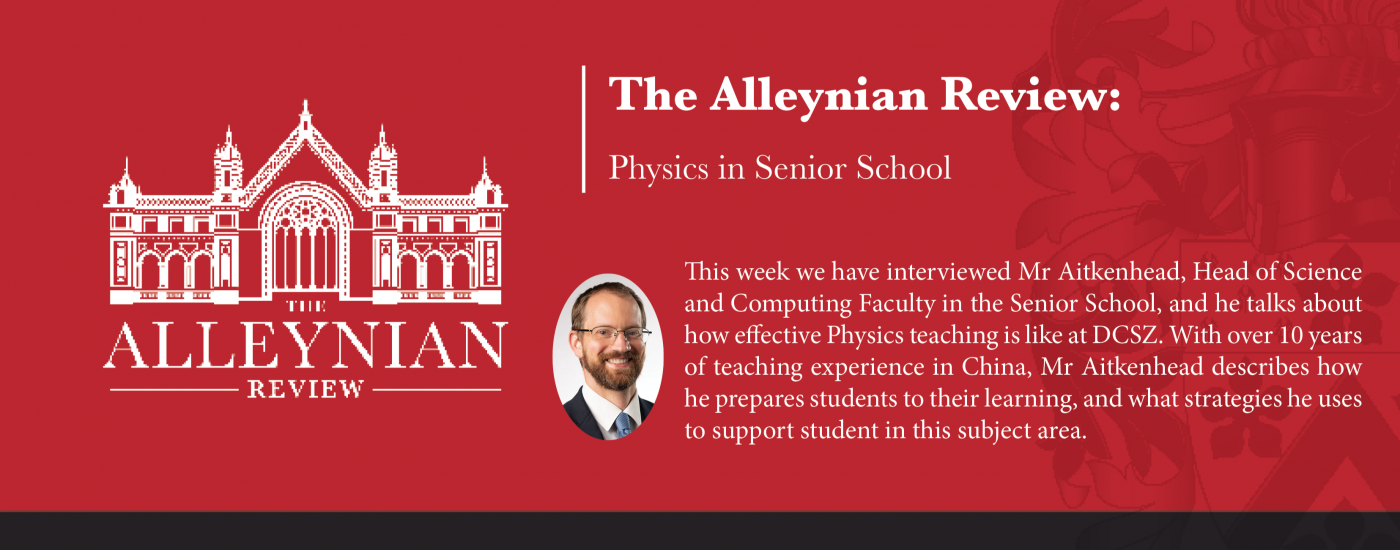Subject Spotlight: Physics in Senior School

Hello, Mr Aitkenhead! Firstly, can you please introduce yourself and your teaching background?
I have been teaching physics for Dulwich in China for more than 10 years now. Before that, I taught at Trinity Academy in Scotland for a year and then I moved to China, specifically Hangzhou Foreign Language School and taught IGCSE and A-Level Physics for 3 years. I got both my bachelor’s degree in Astrophysics at The University of Edinburgh and my PGDE in Physics with Science. More recently, I attained my master’s degree in Educational Leadership at The University of Edinburgh. Now I teach Science to Year 7, 8 and 9 students, and physics from Year 10 to Year 13 at Dulwich College Suzhou.
Can you briefly introduce the courses you teach at DCSZ?
I teach students from Year 10 to Year 13 physics. In terms of our Key stage 3 science (from Year 7 to Year 9), the courses will be more like a mixture of chemistry , biology and physics. Students will spend equal time learning about each of these Sciences. They will do as many experiments and practicals as possible. I want them to learn by doing. In this way, it will help them to build inquiry learning and develop their interests in science. Even now, due to pandemic, we have no choice but to do online learning, we also try our best to give students immersive experiments by using simulated ones. We have simulations that work like games where you learn physics knowledge by manipulating and changing variables to see what is going on. After all, scores in assessments are one thing, but practical skills are vital.
In terms of our Key Stage 4 (from Year 10 to Year 11), students learn IGCSE Physics. Likewise, by doing practical activities, skills will be developed through student’s inquiry. If they discover something by themselves, it will be more likely for them to retain such knowledge. More importantly, I want to support them in preparing necessary skills before they enter university.
In terms of our Key Stage 5 (from Year 12 to Year 13), the course covered is IB physics. This contains both standard level (SL) and higher level (HL) physics. The IB course is definitely more difficult for students to learn than their IGCSEs were, but myself and our excellent teaching team guide them by giving them support and scaffolding, by giving them fundamental knowledge and ensuring understanding, they will be able to master a task or concept step by step. In this way, they will have a deeper level of learning and get a better understanding of what they learn.
Thanks for that introduction! Please tell us about a unit or lesson that you taught recently.
Take our Year 13 courses as an example. They are conducting an experiment called “Half Life of (non-alcoholic) beer foam.” When they pour a glass of beer, the gas in the beer forms bubbles. When you are going to drink the beer, you usually will try to minimize the bubbles. But in this experiment, you will make as much foam as possible by pouring fast and from a height. The bubbles burst randomly so this resembles radioactive decay. If they measure the height of the foam downwards from the final level(when there is no foam), then they will get an exponential decay that is proportional to the decay of the foam. Students therefore are able to gain an explicit understanding of what this decay looks like, be able to visualise it clearly, and have a firm grasp of what is going on, before the learn and use the equations behind this decay.
Beyond the subject learning, how did this also prepare students to live worldwise?
We want students to develop self-learning skills. I endeavour to teach them not only physics knowledge but also how to learn new skills. They need to build their ‘learning muscles’ and try new things. What’s more, when students ask questions, I will scaffold their journey to achieve success on their own by giving them enough support, to allow them to reach the answer for themselves. After all, to me, it’s not enough just for students to enter university. They need to be successful during studying in university and to become successful in their future career.
What strategies did you use to support students’ learning in this unit?
Firstly, the inquiry method is quite important. For example, instead of teaching a theory, I will get students to do experiments related to the theory I want them to learn. Then during the experiment, I will guide them to the right answer and thus they will learn the theory step by step. After that, students discuss the theory they have learned. Hence, they will discover their own misunderstandings and misconceptions during these discussions, and I will work with them to correct these. Second, group projects are also a good way to learn. For example, if I want to teach the topic “power plants”, then students will be divided into groups each with a different types of power plant to create a model of, like using nuclear energy to generate power, using wind, using sunlight and tidal forces, and so on.
Then they need to produce models. Finally, they will have an “Energy Expo” where students go to see each of the other group’s project and ask questions. In this way, they will not only learn every topic but also be experts in a specific topic.
What can students do to keep improving their Physics?
Physics is a bridge to many opportunities. I suggest that students should ask more questions and try to understand why. I want them to get into good universities and go into future careers. The most important thing is that they need to perform well in their future careers. Physics is not only about finding the truth, but to create a model that we can easily apply to make efficient predictions for the behaviour of everything in the universe. After all, the ultimate goal for physics is to drive progress for the whole human race.
Thanks to Mr Aitkenhead for introducing his recent unit and explaining what Physics teaching is like at DCSZ.






